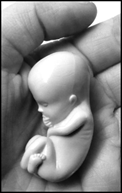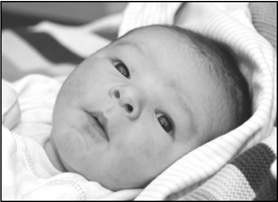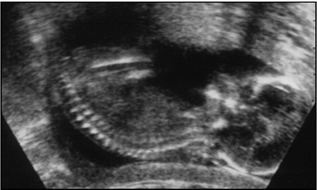Catholic Medical Quarterly Volume 69(3) August 2019
Papers
Abortion in the U.S. and the Question of Personhood of the Foetus
Fr Ward Biemans SJ
 This
year, very significant developments are taking place in the abortion
legislation of several American states. In April, Ohio's Governor Mike
DeWine signed a bill, referred to as ‘heartbeat bill’. The bill bans
abortion after the foetus’s heartbeat can be heard, which is usually after
about six weeks of pregnancy. In May, Georgia’s Governor Brian Kemp signed
a similar bill. A difference between the two bills is that Georgia’s
heartbeat bill includes exceptions in cases that involve rape or incest
when the woman files a police report, whereas Ohio’s bill does not include
these exceptions. Earlier, the states of Mississippi and Kentucky passed
laws that would ban most abortions after a heartbeat is detected. However,
in March a Kentucky judge temporarily blocked the bill from being
enforced. Abortion rights groups have already challenged Mississippi's law
and have announced to do the same elsewhere. Nevertheless, in several
other states lawmakers are still considering heartbeat bills.
This
year, very significant developments are taking place in the abortion
legislation of several American states. In April, Ohio's Governor Mike
DeWine signed a bill, referred to as ‘heartbeat bill’. The bill bans
abortion after the foetus’s heartbeat can be heard, which is usually after
about six weeks of pregnancy. In May, Georgia’s Governor Brian Kemp signed
a similar bill. A difference between the two bills is that Georgia’s
heartbeat bill includes exceptions in cases that involve rape or incest
when the woman files a police report, whereas Ohio’s bill does not include
these exceptions. Earlier, the states of Mississippi and Kentucky passed
laws that would ban most abortions after a heartbeat is detected. However,
in March a Kentucky judge temporarily blocked the bill from being
enforced. Abortion rights groups have already challenged Mississippi's law
and have announced to do the same elsewhere. Nevertheless, in several
other states lawmakers are still considering heartbeat bills.
The state of Alabama went even further in their restriction of abortion. The bill that passed in May makes all abortions a felony offense for a doctor who performs it except in cases of serious health risks to the unborn child's mother. Women who receive an abortion will not be held criminally culpable or civilly liable for receiving the abortion. When signing it, Governor Kay Ivey acknowledged that because of earlier jurisdiction, enforcing this bill would be difficult. However, she made her intentions clear: ‘As citizens of this great country, we must always respect the authority of the U.S. Supreme Court even when we disagree with their decisions. Many Americans, myself included, disagreed when Roe v. Wade was handed down in 1973. The sponsors of this bill believe that it is time, once again, for the U.S. Supreme Court to revisit this important matter, and they believe this act may bring about the best opportunity for this to occur.’[1]
On the other hand, states like New York have recently passed legislation which extends legalized abortion even further than before. In New York State, abortions after 24 weeks have become legal ‘when necessary to protect a woman’s life or health’. Licensed midwives and nurse practitioners may perform nonsurgical abortions and physician assistants will be permitted to carry out surgical abortions. A similar bill, which would allow late term abortions in Virginia, failed. And in Massachusetts, abortion right advocates pushed through a bill called the NASTY Women Act (Negating Archaic Statutes Targeting Young Women), which formally repeals the state’s 173-year-old law against ‘procuring a miscarriage’. The bill aims to preserve abortion rights in the state in the event that the Supreme Court overturns Roe v. Wade.
The personhood of the foetus
 Underneath
all these legislative actions are very different views on the personhood
of the foetus. Governor Ivey put it like this when she signed the Alabama
bill: ‘this legislation stands as a powerful testament to Alabamians’
deeply held belief that every life is precious and that every life is a
sacred gift from God.’ Although opinions are diverging in relation to what
is the best way to protect unborn human life and human dignity as such,
there are strong biological arguments in support of the continuity of a
child’s development
before and after birth, which could have implications for the recognition
of the personhood of the foetus. In fact, embryonic development is guided
Underneath
all these legislative actions are very different views on the personhood
of the foetus. Governor Ivey put it like this when she signed the Alabama
bill: ‘this legislation stands as a powerful testament to Alabamians’
deeply held belief that every life is precious and that every life is a
sacred gift from God.’ Although opinions are diverging in relation to what
is the best way to protect unborn human life and human dignity as such,
there are strong biological arguments in support of the continuity of a
child’s development
before and after birth, which could have implications for the recognition
of the personhood of the foetus. In fact, embryonic development is guided
 by the DNA in the cell core, which is present and active in its specific
combination from the moment of conception.[2J Also, the fact that a human
embryo is dependent of the mother for its survival, is not fundamentally
different from small children’s dependency of their parents or other
adults. Therefore, the unborn child’s dependency has no implications for
personhood, because it is clear that small children are persons.
by the DNA in the cell core, which is present and active in its specific
combination from the moment of conception.[2J Also, the fact that a human
embryo is dependent of the mother for its survival, is not fundamentally
different from small children’s dependency of their parents or other
adults. Therefore, the unborn child’s dependency has no implications for
personhood, because it is clear that small children are persons.
Seen from a philosophical point of view, all limits to the acknowledgment of personhood before or after birth are artificial. As Don Marquis has already made clear in his famous essay on the immorality of abortion: abortion deprives the foetus of a future like ours, which is potentially valuable.[3] However, discussions on the morality of abortion often tend to focus on extreme and tragic cases like incest and rape. Often it is overlooked that other, much more frequent and also very painful cases of unintended pregnancy are at stake, for instance when the couple has financial problems, or when the male begetter just disappears from the woman’s life, or when he or the woman’s parents put her under pressure to have an abortion. In all these cases women deserve all the support they need from her family, her loved ones and from society to take care of her child, regardless the question if the pregnancy is intended or not.
 The
Catholic viewpoint has always been that human life, both before and after
birth must be protected and deserves the utmost care. It is of great
importance that the policy of restricting abortion is integrated with the
provision of all needed support of expecting couples and families. In the
U.S. and the U.K. this support is mostly privately financed by pro-life
organisations, as well as charities that provide support in cases of
adoption and foster care. With regard to the prevention of abortion,
schools can do a lot in stimulating a pro-life mentality, for instance in
their Relationships and Sex Education, by paying more attention to
communication skills needed for building up long-lasting relationships and
to virtues like fidelity and self-discipline, rather than a too narrow
focus on issues like LGBT or artificial birth control.
The
Catholic viewpoint has always been that human life, both before and after
birth must be protected and deserves the utmost care. It is of great
importance that the policy of restricting abortion is integrated with the
provision of all needed support of expecting couples and families. In the
U.S. and the U.K. this support is mostly privately financed by pro-life
organisations, as well as charities that provide support in cases of
adoption and foster care. With regard to the prevention of abortion,
schools can do a lot in stimulating a pro-life mentality, for instance in
their Relationships and Sex Education, by paying more attention to
communication skills needed for building up long-lasting relationships and
to virtues like fidelity and self-discipline, rather than a too narrow
focus on issues like LGBT or artificial birth control.
If the new legislations on abortion do reach the U.S. Supreme Court, which is likely going to happen, it may provide a real opportunity for Roe v. Wade to be overturned. When Justice Brett Kavanaugh became a member of the Supreme Court, a branch of juridical interpretation known as ‘originalism’ got a fresh impetus. When the Senate confirmation hearings took place last year, Kavanaugh described himself as an originalist, seeking to identify the ‘original public meaning of the constitutional text at issue’.[4] Remarkably, when in 1868 the Fourteenth Amendment of the U.S. Constitutions had been adopted, which aims at equal protection of the laws for all persons, nearly every American state had criminal legislation proscribing abortion, and most of these statutes were classified among ‘offenses against the person’. Thus, as Joshua Craddock rightly remarks in the Harvard Journal of Law & Public Policy: ‘The original public meaning of the term “person” thus incontestably included prenatal life.’[5] In this light, it will be most interesting to see what the Supreme Court will make of a revision of Roe v. Wade.
References
- Cason M. Gov. Kay Ivey signs bill to ban abortion in Alabama.
AL.com, 15-05-2019, Cf.
https://www.al.com/news/2019/05/govkay-ivey-signs-bill-to-ban-abortion-in-alabama.html,
accessed 22-5-2019. - Eijk WJ. The status of the human embryo. In: Eijk WJ, Hendriks LM, Raymakers JA and Fleming JI (eds.). Manual of Catholic Manual Ethics. Responsible Healthcare from a Catholic Perspective, Ballarat, 2014, 158.
- Marquis D. Why Most Abortions are Immoral. In: Edwards RB and Bittar E (eds.). Advances in Bioethics. Bioethics for medical education. Volume 5, 1999, 215-244.
- Root D. Brett Kavanaugh Flunks His First Test as an Originalist. Reason, 25-02-2019, cf. https://reason.com/2019/02/25/brettkavanaugh-flunks-his-first-test-as/, accessed 22-05-2019.
- Craddock JJ. Protecting Prenatal Persons: Does the Fourteenth Amendment Prohibit Abortion? Harvard Journal of Law & Public Policy, 2017 (40), no. 2, 539-571.
